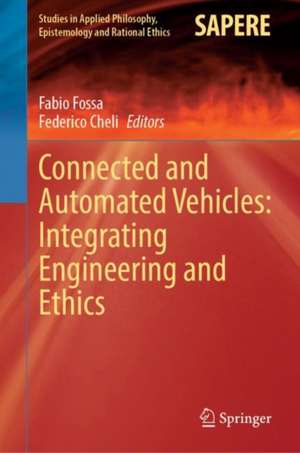Connected and Automated Vehicles: Integrating Engineering and Ethics: Studies in Applied Philosophy, Epistemology and Rational Ethics, cartea 67
Editat de Fabio Fossa, Federico Chelien Limba Engleză Hardback – 23 sep 2023
Din seria Studies in Applied Philosophy, Epistemology and Rational Ethics
- 20%
 Preț: 603.89 lei
Preț: 603.89 lei -
 Preț: 397.59 lei
Preț: 397.59 lei -
 Preț: 359.53 lei
Preț: 359.53 lei - 20%
 Preț: 989.96 lei
Preț: 989.96 lei - 24%
 Preț: 787.48 lei
Preț: 787.48 lei -
 Preț: 390.08 lei
Preț: 390.08 lei -
 Preț: 370.88 lei
Preț: 370.88 lei - 15%
 Preț: 641.20 lei
Preț: 641.20 lei - 20%
 Preț: 991.60 lei
Preț: 991.60 lei - 20%
 Preț: 646.95 lei
Preț: 646.95 lei - 15%
 Preț: 653.98 lei
Preț: 653.98 lei -
 Preț: 384.48 lei
Preț: 384.48 lei -
 Preț: 395.47 lei
Preț: 395.47 lei - 18%
 Preț: 1216.95 lei
Preț: 1216.95 lei - 18%
 Preț: 947.50 lei
Preț: 947.50 lei -
 Preț: 388.72 lei
Preț: 388.72 lei -
 Preț: 390.08 lei
Preț: 390.08 lei -
 Preț: 395.09 lei
Preț: 395.09 lei -
 Preț: 394.12 lei
Preț: 394.12 lei - 15%
 Preț: 644.82 lei
Preț: 644.82 lei - 15%
 Preț: 698.15 lei
Preț: 698.15 lei - 18%
 Preț: 1840.91 lei
Preț: 1840.91 lei - 20%
 Preț: 656.84 lei
Preț: 656.84 lei -
 Preț: 389.70 lei
Preț: 389.70 lei - 20%
 Preț: 991.46 lei
Preț: 991.46 lei - 15%
 Preț: 585.73 lei
Preț: 585.73 lei - 15%
 Preț: 711.40 lei
Preț: 711.40 lei - 15%
 Preț: 589.33 lei
Preț: 589.33 lei - 15%
 Preț: 700.42 lei
Preț: 700.42 lei
Preț: 946.55 lei
Preț vechi: 1154.34 lei
-18% Nou
Puncte Express: 1420
Preț estimativ în valută:
181.15€ • 187.13$ • 150.76£
181.15€ • 187.13$ • 150.76£
Carte tipărită la comandă
Livrare economică 26 martie-09 aprilie
Preluare comenzi: 021 569.72.76
Specificații
ISBN-13: 9783031399909
ISBN-10: 3031399900
Pagini: 195
Ilustrații: XIV, 195 p. 12 illus., 8 illus. in color.
Dimensiuni: 155 x 235 mm
Greutate: 0.48 kg
Ediția:1st ed. 2023
Editura: Springer Nature Switzerland
Colecția Springer
Seria Studies in Applied Philosophy, Epistemology and Rational Ethics
Locul publicării:Cham, Switzerland
ISBN-10: 3031399900
Pagini: 195
Ilustrații: XIV, 195 p. 12 illus., 8 illus. in color.
Dimensiuni: 155 x 235 mm
Greutate: 0.48 kg
Ediția:1st ed. 2023
Editura: Springer Nature Switzerland
Colecția Springer
Seria Studies in Applied Philosophy, Epistemology and Rational Ethics
Locul publicării:Cham, Switzerland
Cuprins
1.Chapter 1:Minding the Gap(s). Different Kinds of Responsibility Gaps Related to Autonomous Vehicles and How to Fill Them.- Chapter 2 Designing Driving Automation for Human Autonomy. Self Determination, the Good Life, and Social Deliberation.- Chapter 3 Contextual Challenges to Explainable Driving Automation. The Case of Machine Perception.- Chapter 4 Design for Inclusivity in Driving Automation. Theoretical and Practical Challenges to Human-Machine Interactions and Interface Design.- Chapter 5 From Prototypes to Products. The Need for Early Interdisciplinary Design.- Chapter 6 Gaming the Driving System. On Interaction Attacks against Connected and Automated Vehicles.- Chapter 7 Automated Driving Without Ethics: Meaning, Design and Real-World Implementation.- 8 Thinking of Autonomous Vehicles Ideally.- Chapter 9 Thinking about Innovation: The Case of Autonomous Vehicles.- Chapter 10 Autonomous Vehicles, Artificial Intelligence, andColliding Narratives.
Textul de pe ultima copertă
This book reports on theoretical and practical analyses of the ethical challenges connected to driving automation. It also aims at discussing issues that have arisen from the European Commission 2020 report “Ethics of Connected and Automated Vehicles. Recommendations on Road Safety, Privacy, Fairness, Explainability and Responsibility”. Gathering contributions by philosophers, social scientists, mechanical engineers, and UI designers, the book discusses key ethical concerns relating to responsibility and personal autonomy, privacy, safety, and cybersecurity, as well as explainability and human-machine interaction. On the one hand, it examines these issues from a theoretical, normative point of view. On the other hand, it proposes practical strategies to face the most urgent ethical problems, showing how the integration of ethics and technology can be achieved through design practices. All in all, this book fosters a multidisciplinary approach where philosophy, ethics, and engineering are integrated, rather than just juxtaposed. It is meant to inform and inspire an audience of philosophers of technology, ethicists, engineers, developers, manufacturers, and regulators, among other interested readers.
Caracteristici
Offers a unique engineering ethics discussion on autonomous vehicles Bridges between ethical theory and practice in the field of autonomous mobility Addresses challenges poses by the European Guidelines 2020 on the Ethics of Connected and Automated Vehicles
